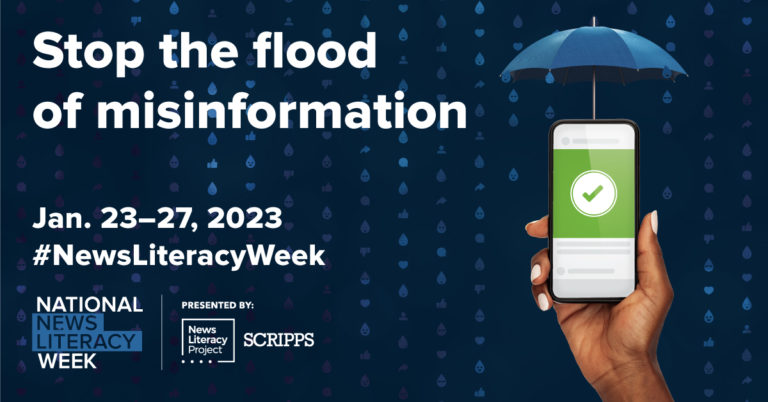National News Literacy Week to Explore Declining Trust In News Media
National News Literacy Week is backed by the News Literacy Project and The E.W. Scripps Company

WASHINGTON, D.C.—This year’s fourth annual National News Literacy Week, from Jan. 23-27, will explore the public’s declining trust in the news media and encourage news consumers to stop the flood of misinformation by learning how to identify trustworthy news.
The week, which includes events and resources that will explore the complex issues relating to declining trust in national news media, will highlight successful efforts to help rebuild credibility. The National News Literacy Week is being co-presented by the News Literacy Project and The E.W. Scripps Company
In the runup to the event, the backers cited the Edelman Trust Barometer, which shows that faith in the media is falling across the globe, and particularly in the United States. Only 39% of American adults said they trust the media in 2022, down six points from 2021. At the same time, concern about false and misleading information is at an all-time high. This year’s news literacy event tackles these challenges with free tips, tools and conversations, both online and in-person, the News Literacy Project and Scripps said.
“The American public is struggling to make sense of the crush of news and information they are confronted with daily, as misinformation surges on social media and local news outlets shrink,” said Charles Salter, president and CEO of NLP. “News literacy skills help media consumers understand what makes news trustworthy, and National News Literacy Week will help ensure that more people can confidently navigate the news.”
To help bolster public trust in the news, this year’s theme will examine past missteps made by newsroom decision makers and help demystify how the news gets made at credible outlets.
“A healthy democracy depends on an informed and educated citizenry and a trustworthy journalism industry,” said Adam Symson, president and CEO of Scripps. “For this year’s National News Literacy Week, we’re shining a light on the news gathering and reporting process to further enhance openness and transparency with our local and national news audiences across the country.”
Two of this year’s events will be livestreamed and in-person:
Get the TV Tech Newsletter
The professional video industry's #1 source for news, trends and product and tech information. Sign up below.
- We regret the error: Public trust and media accountability: 6 p.m. ET on Monday, Jan. 23, at the National Press Club in Washington, D.C. National newsroom leaders from the Washington Post, NPR, Axios, Scripps and more discuss the lessons they’ve learned from past mistakes – editorial, business, staffing and otherwise.
- Trust issues: How Chicago news outlets build credibility in their communities: 6 p.m. ET on Tuesday, Jan. 24, at the Medill School of Journalism at Northwestern University in Evanston, IL. Innovative journalists from the Chicago Sun-Times, Block Club, City Bureau and Northwestern will explain how they are earning trust by involving their audiences in the editorial process.
For educators, NLP and NBCUniversal News Group will host on Jan. 27 a virtual NewsLitCamp, a professional learning experience that connects teachers with practicing journalists. Sessions are designed to help educators build news literacy expertise they can bring back to their classrooms.
Other livestreamed discussions will include participants from the American Psychological Association, KQED, San Francisco’s NPR-member station; Teens for Press Freedom, a national youth-led organization; EduColor, an educator advocacy group that supports communities of color; and misinformation experts from NLP.
Visit here for a full listing of events, participants and supporting organizations.
George Winslow is the senior content producer for TV Tech. He has written about the television, media and technology industries for nearly 30 years for such publications as Broadcasting & Cable, Multichannel News and TV Tech. Over the years, he has edited a number of magazines, including Multichannel News International and World Screen, and moderated panels at such major industry events as NAB and MIP TV. He has published two books and dozens of encyclopedia articles on such subjects as the media, New York City history and economics.

